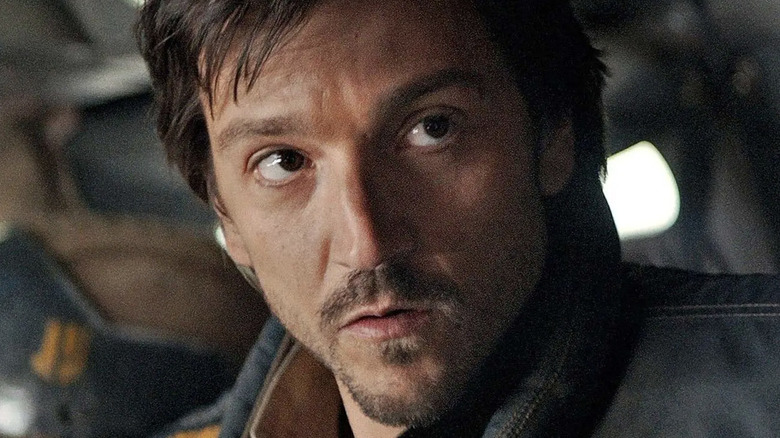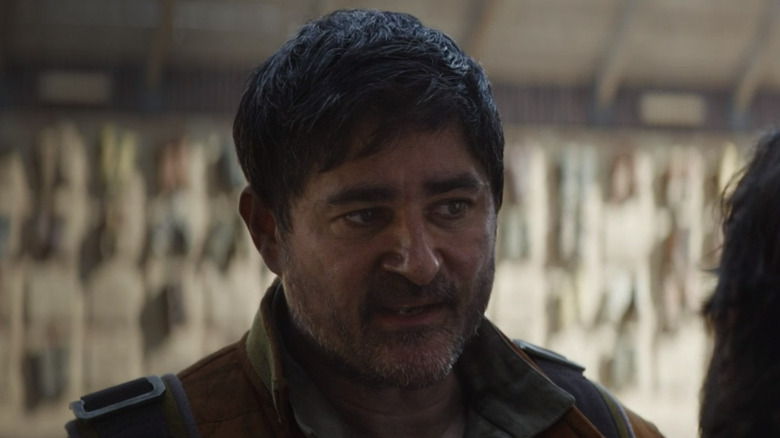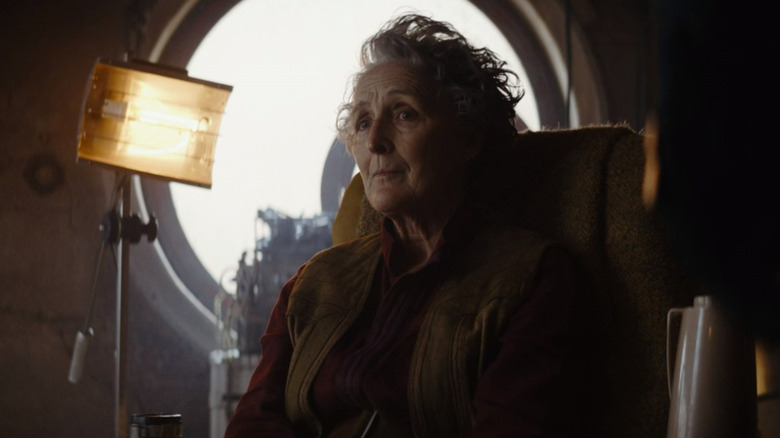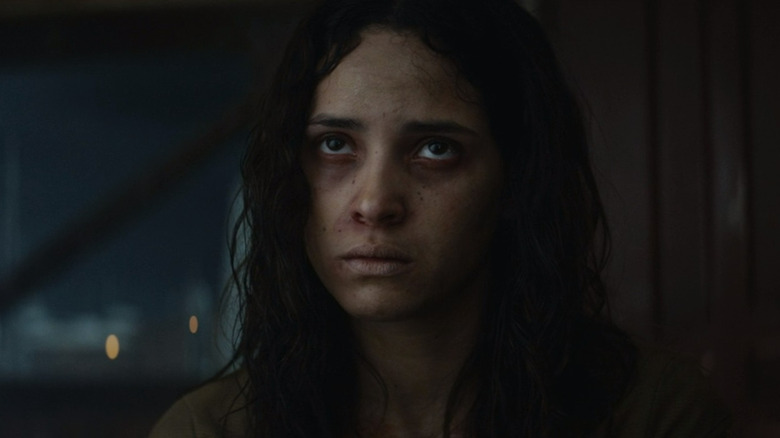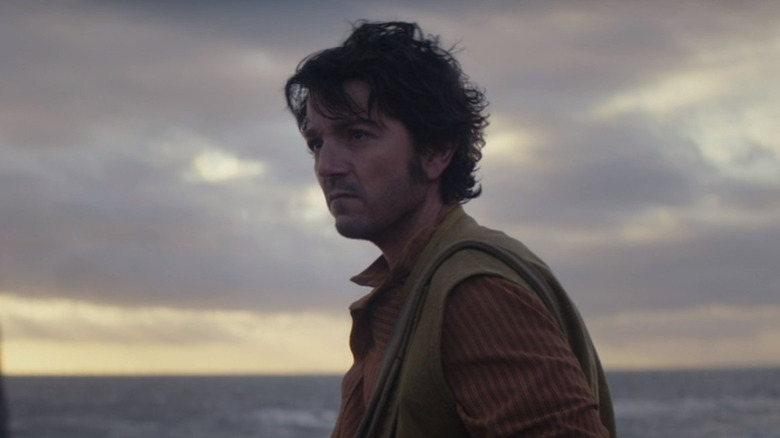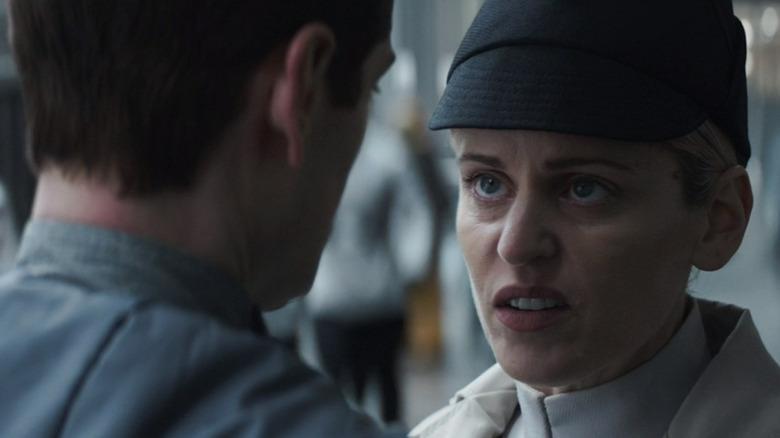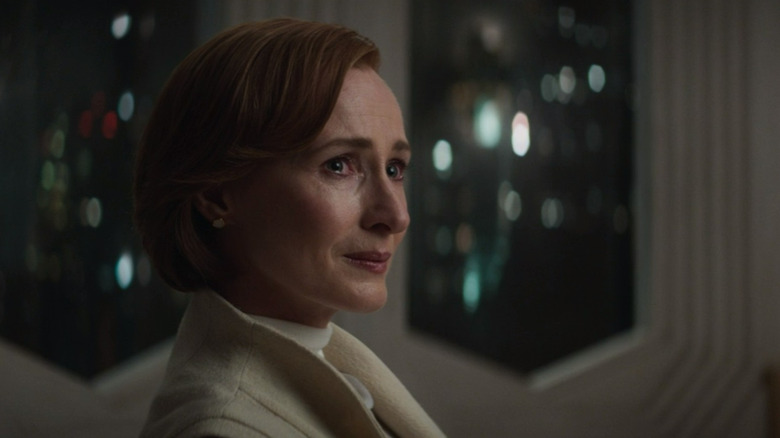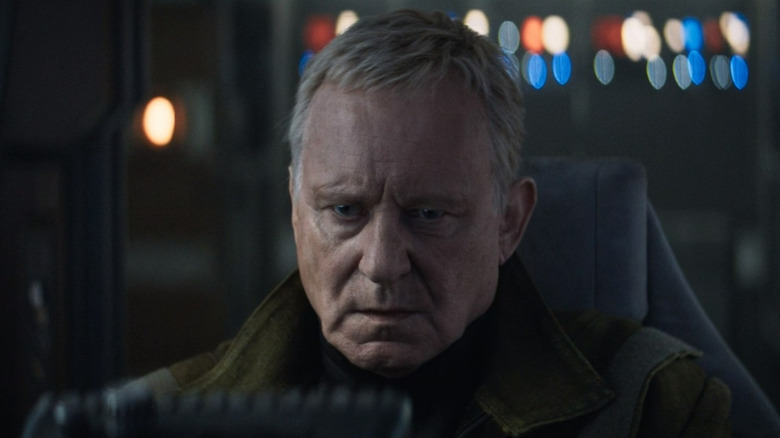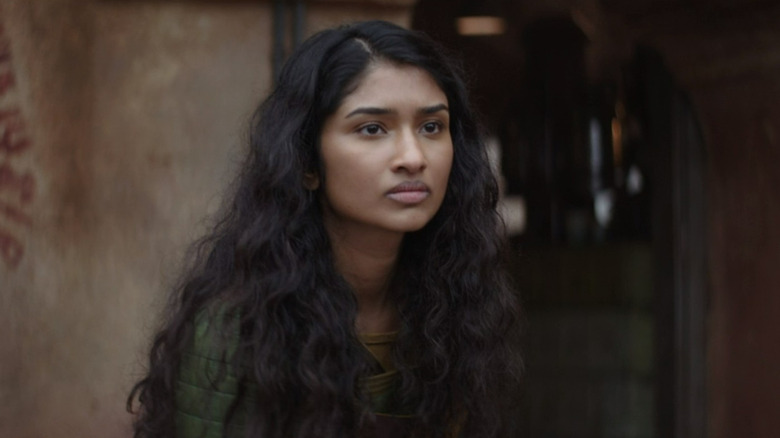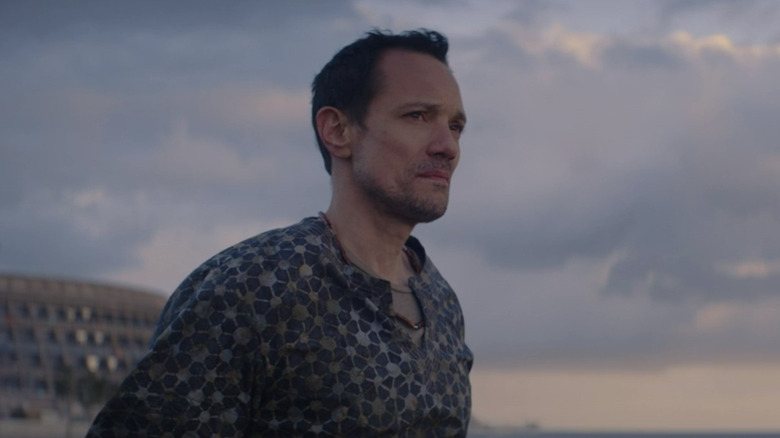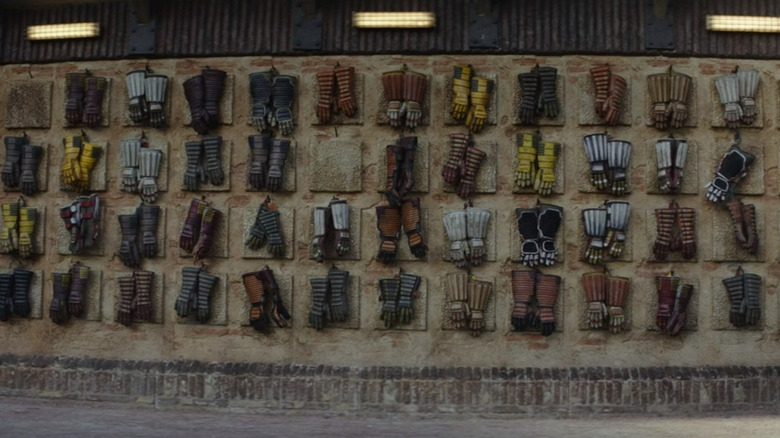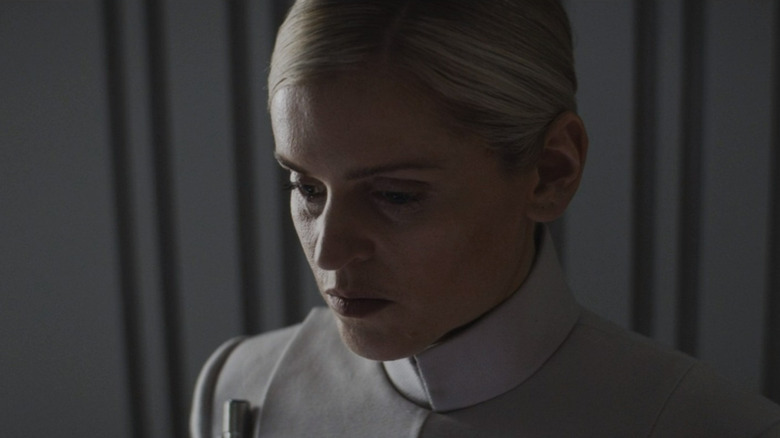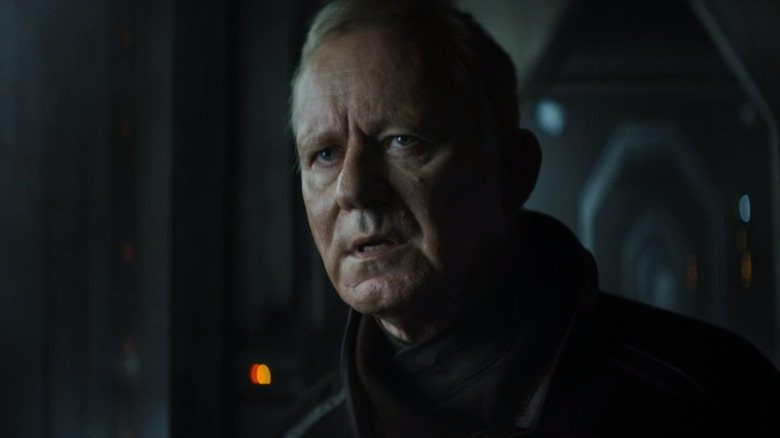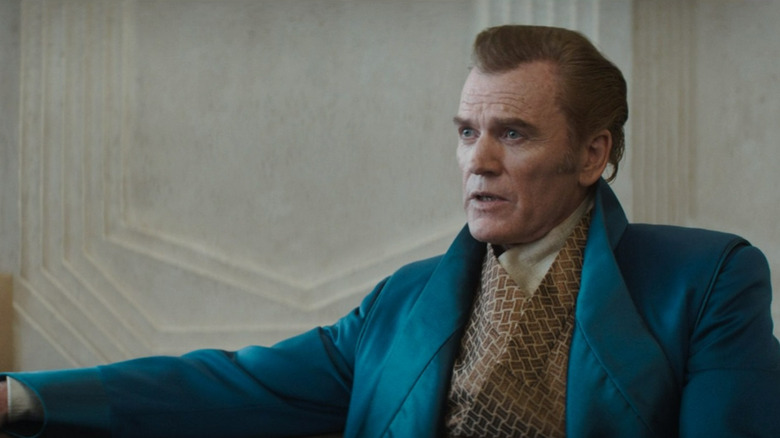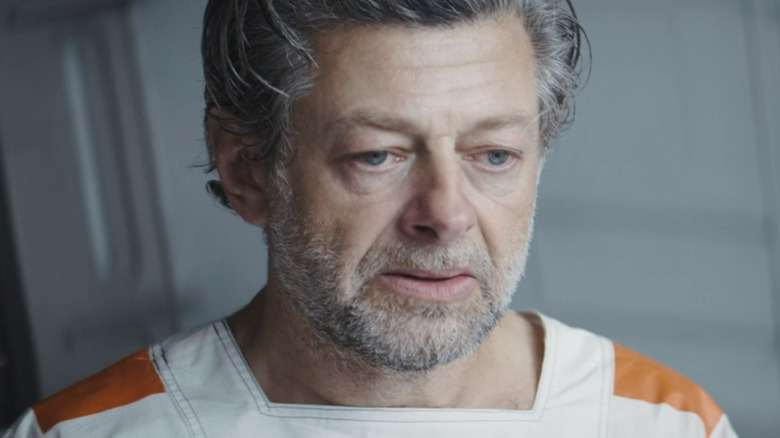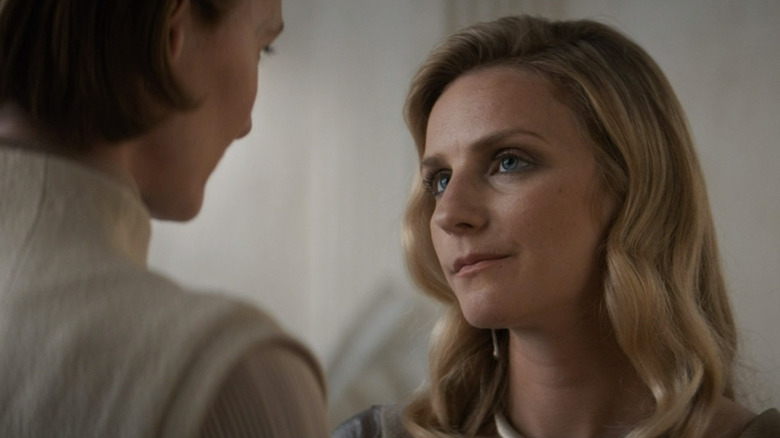The Ending Of Andor Season 1 Explained
You'd be forgiven for not paying "Andor" much attention when it was first announced. A prequel series to a "Star Wars" spin-off film, it didn't seem destined for success, especially after "The Book of Boba Fett" and "Obi-Wan Kenobi" met lackluster receptions with much more popular characters. Little did we know back then that "Andor" Season 1 would be one of the greatest "Star Wars" installments to date.
"Andor" contains a few Easter eggs, but it isn't packed with them. It doesn't have big cameos, or lightsaber duels, or even that many Stormtroopers. But what it does have is a huge cast of perfectly played characters, gorgeous cinematography, and a script that treats the Empire and the rebellion with severity and grit. Sometimes it's a slow-burn show, preferring to spend its time developing complicated relationships through nuanced dialogue. Other times, "Andor" pulls out the big guns, delivering some of the most awe-inspiring and emotionally resonant set pieces the franchise has ever seen.
Over the course of "Andor" Season 1's 12 episodes, a lot of pieces start moving. The seeds of rebellion are watered by Senator Mon Mothma (Genevieve O'Reilly) and the mysterious Luthen Rael (Stellan Skarsgård). The Empire begins to tighten its fascist grip on the galaxy, as seen through the eyes of ISB agent Dedra Meero (Denise Gough) and eternal sad boy Syril Karn (Kyle Soller). And, of course, Cassian Andor himself (Diego Luna) goes from a convictionless rogue to a true believer. A lot happens, so let's unpack the ending of "Andor" Season 1 and all its implications. Be warned, there will be major spoilers ahead.
The spark that lights the fire
It seems only right that "Andor" would end on the same planet where it begins; Cassian's brickhouse homeworld of Ferrix. This is a show about grassroots radicalism, about what it takes for regular people to take up arms and risk their lives to fight an oppressive power structure. The people of Ferrix have been suffering under Imperial rule all season, so it's both predictable and powerful that they would be the ones to rise up in symbolic resistance in the season finale.
After seeing all the characters spread across the galaxy for most of Season 1, it's fun to watch them all gather on Ferrix for the funeral of Cassian's adoptive mother Maarva (Fiona Shaw). Imperials and rebels alike come out in the hopes of catching Cassian, but his friends and family on Ferrix have other plans. After playing a recording of Maarva's final words — a stirring speech telling her people to fight back — the assembled crowd storms the barricades, showing that they'll no longer sit quietly under the boot of fascism.
It's not entirely clear how planned out this revolt is, but the implication is that Ferrix came prepared. We see Wilmon Paak (Muhannad Bhaier) building pipe bombs the night before, readying his retribution for the killing of his father. And when the funeral procession comes, it comes much earlier than the Empire expected, and with more people. Surely Brasso (Joplin Sibtain) would have watched Maarva's speech beforehand and known the likely result?
Maarva and Nemik's legacy of rebellion
Maarva Andor dies unceremoniously at the beginning of "Andor" Episode 11 — off screen and without any meaningful final words. But if you thought that was the last you'd see of Fiona Shaw's impeccable performance, you were wrong. Maarva leaves behind a lasting legacy of resistance, telling the citizens of Ferrix to rise up and fight and encouraging her son to become the hero she always knew he could be. When the imperial officer tries to silence her hologram by throwing his coat over it, the message plays on undeterred. It seems it's not so easy to put out a fire once it's been lit.
Her last words, "Fight the Empire," ring like a four-syllable slogan over the entire show. Though many are killed in the battle that breaks out, we understand that their sacrifices are meaningful. "Remember that the frontier of the rebellion is everywhere," Karis Nemik (Alex Lawther) writes in his manifesto, "and even the smallest act of insurrection pushes our lines forward."
We're told that the dead of Ferrix are burned, their ashes baked into bricks, and those bricks put into the walls of the city. But Maarva's brick becomes a literal weapon, with Brasso using it to strike the first blow in her funeral uprising. Nemik's words, likewise, become the fuel for Cassian to commit to the cause. They wouldn't have wanted it any other way.
Bix and the gang get away
Against all odds, most of the main Ferrix characters make it out at the end of "Andor" Season 1. Shipyard hand Pegla (Kieran O'Brien) gets a vessel ready and fueled up for Brasso, Wilmon, B2EMO, and Jezzi (Pamela Nomvete) — another hint that the whole revolt was premeditated. What the crew couldn't have fully planned on, however, was Cassian's return and successful rescue of Bix Caleen (Adria Arjona). It's interesting to note that Ferrix would have almost surely still fought back even if Cassian hadn't returned. While he's a central figure in the story of the show, he's just one man in a movement that needs every body it can get.
In reality, Cassian doesn't come back to fight at all. He comes to complete bits of unfinished business: Seeing Maarva laid to rest (or, as it turns out, laid into the head of an Imperial bootlicker), and rescuing Bix. he does both of those things and helps ensure that the Ferrix gang is able to get away safely. Where they'll go and how safe they'll actually be is unclear, but given the abject chaos of the revolt, they have a decent chance at flying under the Empire's radar. Hopefully, with a bit of peace, Bix can recover from the deplorable torture perpetrated against her.
As for the rest of Ferrix, there might not be such a happy ending. The Empire could come back even worse than before, but even if they do, it's pretty clear that Ferrix has become ungovernable.
Cassian joins the fight
It's a testament to Cassian Andor's skill that he evades every one of the half-dozen people who come to capture or kill him on Ferrix. He clocks Luthen in the crowd early on and puts two and two together, realizing that the rebel leader means to eliminate him to tie up loose ends. With this knowledge, Cassian could have fled with Brasso and Bix. Instead, he seeks out Luthen's ship, parked in the same spot they escaped from in Episode 3, and waits for him to return.
"You came here to kill me," Cassian says as he confronts Luthen. "You don't make it easy," the older man responds. Then Cassian hits him with the unexpected: "I will now." Having intentionally left his blaster for Luthen to take, Cassian gives him an ultimatum: "Kill me, or take me in."
It's a dramatic move, and the line on which "Andor" Season 1 ends. But it's a necessary one to prove Cassian's newfound dedication to the rebellion. When the two men last spoke, he was little more than a common rogue — a man with potential, sure, but he vocally opposed joining any organized resistance movement. In order to convince Luthen of how dedicated he's become after his experiences on Narkina 5, he puts his very life in Luthen's hands. This is a huge step on Cassian's path to becoming the man we meet in "Rogue One," and it sets up a ton of potential for "Andor" Season 2.
Dedra and Syril's relationship
One of the most interesting (Grotesque? Deliciously uncomfortable? Makes your skin crawl but you can't stop watching?) relationships in "Andor" Season 1 is between Syril Karn and Dedra Meero. Dedra is a rising star in the Imperial Security Bureau who likes murdering rebels, experimental torture techniques, and long walks on the beach. Syril is just as disturbed. Together, they're a match made in the deepest corners of nightmareland. So, naturally, Syril saves Dedra's life in the season finale.
Prior to the fighting on Ferrix, Dedra makes it very clear to Syril that she wants nothing to do with him — understandable after he stalks her to her place of work and declares his love for her in the middle of the street. But what do you do with a guy like that after he pulls you out of a mob that's about to tear you to literal pieces? If you're Dedra, you say thank you while shaking convulsively.
Where these two go next is anyone's guess, but it should be impossible to look away from, like a train crash happening in slow motion. It's hard to imagine Syril's heroics have really made him any more enticing to Dedra, and the man will still have to answer for stealing from his emotionally abusive mother. Evil power couple or human timebomb? We can't wait to find out.
Mon Mothma takes drastic measures
In a season filled with anxious people, Mon Mothma may be the most anxious of all, and for good reason. She doesn't have to suffer the horrors of Imperial prisons or extensive torture, so taking on a bit of stress is the least she can do for the cause, but that doesn't make her moves at the end of "Andor" Season 1 any easier to watch.
Faced with the prospect of the Empire discovering that she's secretly funding the rebellion, Mon makes an impossible choice: She agrees to introduce her teenage daughter Leida (Bronte Carmichael) to the son of high-profile loanshark Davo Sculdun (Richard Dillane) in a Chandrilan custom that will almost surely lead to marriage. In exchange, Davo will make all of Mon's accounting troubles go away, protecting her from the prying eyes of the Empire. Even though Leida seems to love the old Chandrilan traditions — a disturbing fact given the way they seem to strip her of her rights — this is a hard moment to watch. Mon effectively sells her daughter for the good of the rebellion.
We also see Mon accusing her lousy husband Perrin (Alastair Mackenzie) of gambling, which he denies. Their driver eavesdrops on the conversation and later reports to the ISB. Since Mon knows her driver is a spy, and since Perrin appears to be telling the truth, this is probably all part of her plan — planting a false explanation for the inconsistencies in their family accounts that will divert attention away from the rebellion. She's become quite adept at covering her tracks, but at what cost?
Luthen and his schemes
By the end of "Andor" Season 1, Mon Mothma seems to have things pretty under control on her end, albeit by planting rumors about her (again, very bad) husband and arranging a marriage for her daughter. Luthen, on the other hand, is on the brink of having his cover fully blown. After narrowly escaping from an Imperial cruiser at the end of Episode 11 (in a very cool scene), he goes straight to Ferrix. This leaves his Coruscant shop fully in the hands of his assistant Kleya (Elizabeth Dulau), who at times seems like she might be the one really running the show.
Though the Empire hasn't seen Luthen's face yet, they have identified his ship, the Fondor, which is a custom job. As such, he might need to be a bit more careful if he does return to Coruscant. There's also the fact that his ISB mole, Lonni (Robert Emms), seems to be getting on Dedra Meero's bad side — not by being suspicious, but by one-upping her at work. Given how good Dedra is at her job, this could be big trouble for Luthen later on. For now, though, he's still a free man, and also ... maybe a Jedi? Probably not, but all those capes and speeches about damnation certainly make you wonder.
Luthen's bigger issues may actually come from the rebellion itself. As seen through Saw Gerrera (Forest Whitaker), many other leaders still resist the idea of a unified rebel alliance. It remains to be seen how Luthen makes that dream a reality.
What's going on with Vel and Cinta?
Two more characters who manage to make it out of "Andor" Season 1 alive are Vel Sartha (Faye Marsay) and Cinta Kaz (Varada Sethu), who reunite on Ferrix just in time to completely miss Cassian and get out in the midst of the chaos. While there's clearly real love between the two of them, it's also apparent that they're in very different places. Vel is a rich girl who threw her old life away to join the rebellion. Cinta, on the other hand, is someone whose entire family was wiped out by Stormtroopers.
As a result, Cinta is a diehard radical — someone who never thinks twice about risking everything for the cause. Vel has more reservations and clearly spends a lot of time thinking about what life could be like if they didn't have to fight all the time. Will the demands of revolution tear Vel and Cinta apart? Is Kleya actually Vel's ex, or is there just a mountain of tension between the two? Only time will tell.
The other rebel survivors
Vel and Cinta aren't the only rebel agents who head out for parts unknown at the end of "Andor" Season 1. Ruescott Melshi (Duncan Pow) says goodbye to Cassian on Niamos at the end of Episode 11, telling him that they had to split up to increase their chances of survival. Melshi seems enlivened to tell the story of what happened on Narkina 5 — of how the Empire is making up prison sentences to create an endless labor pool. And if you've seen "Rogue One," you'll know that Melshi's passion makes him a loyal soldier of the Rebel Alliance later on. He fights alongside Cassian on Scarif at the end of "Rogue One," so it's likely that he'll pop up again in "Andor" Season 2. The revolt on Narkina 5 ultimately becomes a flashpoint moment for the larger show, revealing how sacrifice and mass mobilization can carry the downtrodden to victory over their oppressors.
It's possible that more escapees from the Narkina 5 prison break could join the rebel cause later on. Though his declaration in Episode 10 that he can't swim suggests a grim fate, Andy Serkis' Kino Loy could still be alive. We never see him actually die, and the fates of the other escaped prisoners are left ambiguous. One thing's for sure: With the Empire becoming more oppressive than ever, the rebellion should have an ample supply of new recruits going forward.
Nothing to lose but your chains
Series creator Tony Gilroy has said that he didn't write "Andor" to be a political thinkpiece. He prioritized the story and the characters, and that focus shows. However, it's hard to write a grounded narrative about rebels rising up against a fascist regime and not pick up some larger philosophy along the way. By the end of the finale, "Andor" Season 1 almost reads like a guidebook on how to build a revolution, right down to the stirring manifesto.
"Freedom is a pure idea," Nemik writes in his political treatise. "It occurs spontaneously, and without instruction. Random acts of insurrection are occurring constantly throughout the galaxy. There are whole armies, battalions that have no idea they've already enlisted in the cause." This is the idea that the season finale brings to the forefront: That no regime, no matter how powerful, can stand up to the strength of the people if they all join forces. Nemik insists that the rich and powerful few are no match for the impassioned many, echoing another manifesto from our own world quite clearly.
"Tyranny requires constant effort," Nemik writes. "It breaks. It leaks. Authority is brittle." When the people of Ferrix stand unified against their oppressors, their enemies shatter, and they will continue to do so as the story of "Andor" unfolds.
The more you tighten your grip...
"Andor" Season 1 does a lot to make the Empire scary again. It shows the coldness of Imperial rule, the dehumanization, the way that local populations are scattered, weakened, and stripped of their traditions. It demonstrates the cruelty of the Empire's hard-fisted military rule, and in doing so evokes the atrocities committed by empires in real-world history. It's no secret that George Lucas largely based Palpatine's fictional regime on both the British Empire and American imperialism in the 20th century. "Andor" returns that inspiration to the forefront, and the effect is powerful.
For all its might, however, the Empire in "Andor" still makes many mistakes. Princess Leia's words to Grand Moff Tarkin ring like an overture over the whole show: "The more you tighten your grip, the more star systems will slip through your fingers." If the Empire didn't push such extreme prison sentences; if they didn't double down on military occupations; if they didn't insist on being so extreme in their dominance, then maybe they would have lasted longer. But by increasing their tactics to such violent degrees, they push the citizens of the galaxy to the point of desperation.
What's the only thing left to do when a normal life becomes impossible to live? Fight. And that's exactly what happens.
What do we sacrifice?
Nemik's manifesto speaks powerful truths about the struggle against the Empire: That every act of insurrection matters, and that freedom is always worth fighting for. However, "Andor" also makes it clear that such a revolution requires sacrifices. Over the course of Season 1, we see nearly every character give up something in the interest of the greater good (or as Saw Gerrera simply calls it, war).
Cassian sees Bix tortured and Ferrix occupied as a result of his actions. Mon Mothma risks the safety and stability of her own family. Nemik, Taramyn (Gershwyn Eustache), Lieutenant Gorn (Sule Rimi), and countless prisoners from Narkina 5 give their lives for the cause of freedom. But perhaps the most memorable commentary on sacrifice comes at the end of "Andor" Episode 10 in a monologue from Luthen.
"Calm. Kindness. Kinship. Love." These are the things Luthen says he's sacrificed when asked by Lonni. "I burn my decency for someone else's future. I burn my life to make a sunrise that I know I'll never see." It's a powerful moment beautifully executed by Skarsgård, one that resonates through the remainder of the season. In a franchise that's historically been about heroes doing the right thing, "Andor" is about the dark, violent, and difficult things that are necessary to defeat an empire. "What do I sacrifice?" Luthen asks Lonni in a burning rhetorical. "Everything."
A rebellion without the Force
Themes of sacrifice and questionable morality permeate "Andor." They underscore the dark time in which the show is set — a time when desperation, not ethics or altruism, is the driving force in the rebellion. Luthen's conversations with Saw Gerrera and Mon Mothma show just how divided the existing rebels are, and how afraid they are to take larger steps. The best way to sum up this era of the rebellion might be the fact that no one ever utters the slogan of the Rebel Alliance: "May the Force be with you."
In the original "Star Wars" trilogy, the Force is frequently invoked by rebel leaders. It's a rallying cry; an optimistic invocation that their cause might be a righteous one. But during the era of "Andor," there is no such optimism — no such reverence.
As the story of the show continues in Season 2, we'll likely see the rebellion transform into the one seen in the original films. In "Rogue One," Jyn Erso (Felicity Jones) uses hope as a rallying cry for Cassian and the other rebels, and it seems like they had almost forgotten the meaning of the word. Now, we see the reasons why. Hard, dirty work is necessary to get to a place where hope can thrive, "Andor" seems to say. And that work is far from done at the end of Season 1.
The Death Star post-credits scene
In a "Star Wars" show that eschews Easter eggs and cameos, it might be surprising to learn that "Andor" actually has a post-credits scene. If you wait all the way through to the end of the season finale, you'll be treated to a grim glimpse of what lies in store for Cassian and the rebellion.
A close-up shot shows droids of some sort assembling what appears to be a massive plate or dish of some kind. Look closely, and you'll recognize the connector pieces they're installing as the same devices the prisoners of Narkina 5 were forced to build day after day. The camera then zooms out to reveal that the thing being constructed is actually part of the in-progress Death Star — specifically, the superlaser itself.
This twist was previously theorized by some fans, but the reveal is still impactful. The fact that Cassian was forced to help build the very thing that would ultimately kill him is dark, but there's also a triumph in remembering that he gets the last laugh. By successfully stealing the Death Star plans with Jyn, he ensures the station's destruction. There's a nice literary connectedness in tying these disparate plotlines together, and that intentionality will surely remain in "Andor" Season 2.
Where to next?
"Andor" Season 2 is already on the way, with Tony Gilroy telling Collider in early November 2022 that production would begin on November 21 — two days before the Season 1 finale dropped on Disney+. That means things are already in motion, which is great news for fans. Unfortunately, we may be waiting a while before "Andor" Season 2 actually drops. Speaking with TheWrap in September 2022, Gilroy said that production for Season 2 won't end until August 2023, and that post-production could take as long as another whole year afterwards. That would mean a premiere date sometime in the late summer or early fall of 2024, at the earliest.
As for what "Andor" Season 2 might actually look like, we already have a lot of clues. In an interview with Rolling Stone, Gilroy discussed how Season 2 will cover the remaining four years leading up to "Rogue One," saying that the season will start with a one-year time jump. "The next four years are not about becoming a revolutionary," Gilroy said. "They're about learning to be a leader and how difficult it is to put the alliance together and what happens to people who are the original gangsters versus the establishment and a lot of different other issues." Given the way Season 1 ends, that makes a lot of sense.
"Really, the second half is about, what does time do to these people?" the showrunner added. "People grow up and people get tired and people betray each other and people change their minds and people get weak and people get crazy." With all that in mind, "Andor" Season 2 should definitely be worth the wait. And maybe K-2SO will finally show up.
